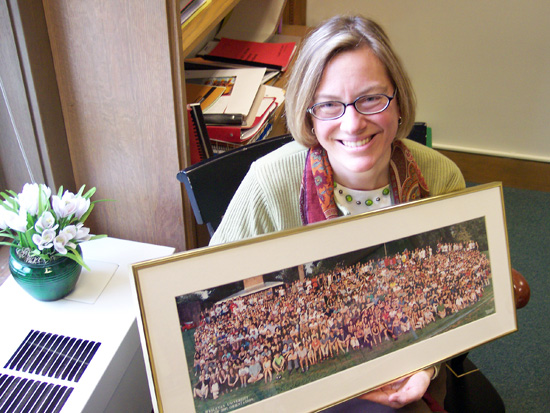Class Dean Guides Students to Make Good Decisions
 |
| Lisa Gates, dean of the class of 2007, holds a photograph of her class inside her office in North College. Gates monitors the academic performance of 760 students. |
| Posted 11/02/05 |
| Steering students toward success is Lisa Gates top priority. As dean of the class of 2007, shes constantly helping students meet or exceed their academic goals on the way to graduation.
Gates meets with many of her 760 students during the academic year. As a class dean, she is responsible for monitoring the academic performance of her class and ensuring students are making appropriate progress toward earning their degrees. But she also helps students resolve academic or personal problems, including working with faculty and staff in many other departments to assist students. “Sometimes they just need my signature for a form,” she says. “But sometimes they’re having difficulty in a particular class or theres an urgent personal situation and a midterm looming the next day. You never know what you’re going to get.” Gates says that one of the principal challenges in being a dean is helping students learn to make good decisions and take responsibility for their actions. “We expect students to be capable, reasonably organized, and responsible, she says. But we forget that these are adult abilities have to be learned and developed with time and experience. It’s my job to both support them through a difficult situation but also push them to take something constructive away from the experience. You can be an extremely bright person, but if you aren’t getting to class and managing your time effectively for whatever reason, you’re going to run into trouble.” She also serves as a general resource for students, discussing different academic directions, internships, leaves of absence and study abroad opportunities. For many students, making a connection to a particular faculty member or a specific program on campus can shape their undergraduate experience in a fundamental way, Gates says. “That’s one of the most satisfying aspects of this position, when a student comes to me with a vague interest and I can give a few names of people that they might want to talk with, she says. It’s nice to have a role in that process.” In 2004, the Dean of the College Office’s model for class management was revised. Deans who normally worked with just one class now follow the same group of students throughout their academic career. Whats good about this new model is that, students can easily remember who their dean is, and they can get to know us better, Gates says. By working with a student multiple years, well be able to support them better. Gates usually splits her time between meeting with students and following up with student issues. Nishita Roy 07, met with Dean Gates this semester to discuss a pressing problem. My first impression of Dean Gates was that she is extremely personable, but also very serious about her work, Roy says. She listened attentively to my problem and took notes when I was talking, which proved that she was intent on ensuring that she had all of the facts straight. I felt extremely comfortable talking with Dean Gates and confident in her desire to assist me to the best of her abilities. Roy says her interaction with Dean Gates reaffirms her opinion that the class deans are generally a valuable resource for students. Theyre committed to improving students’ lives at Wesleyan, she says. Gates usually splits her time between meeting with students and following up with student issues. She holds daily open-office hours. Gates also serves on the International Student Coordinating Committee, coordinates the Beinecke Scholarship Committee and the Janina Montero prize, and participates in various other committees and Dean of the College Office initiatives. Gates moved to Connecticut in 1996 with her husband, Michael Roy, director of academic computing in Information Technology Services. In 2001, she joined the Dean of the College Office as an associate dean and director of New Student Programs. In this position, she worked on redesigning the orientation program for new students and other student programs to help students transition into the university. In 2004, she became a class dean. Gates holds a bachelors degree in German language and women studies from Dartmouth College and a Ph.D in Germanic languages and literatures from Harvard University. She studied abroad in Berlin, Germany and received a Fulbright scholarship to study at the University of Hamburg. Her dissertation focused on the representation of blackness in late-19th and 20th-century German culture, looking specifically at the way in which “racial otherness” served as a vehicle for exploring how Germans understood their own cultural identity. Ive always been interested in the German culture. It is rich with literary history, and this was an interesting way of connecting my professional experiences on issues of race in American culture with my graduate work in German, Gates says. Prior to Wesleyan, she worked at Duke University as a project manager for the Black Periodical Literature Project, a collection of fiction, literary materials and poems produced by the African-American press between 1827 and 1940. She also taught German language and literature courses at Harvard and the University of Connecticut. Teaching is something Id like to do again, she says. I would enjoy interacting with students in another setting. Its a part of my former life that I miss. Gates and Roy live in Higganum with their three children, Ethan, 12; Anna, 9, and Julian, 3. In her spare time, she enjoys gardening herbs and flowers, cooking and writing. Her work is often published in Preview Connecticuts art section. |
| By Olivia Drake, The Wesleyan Connection editor |

